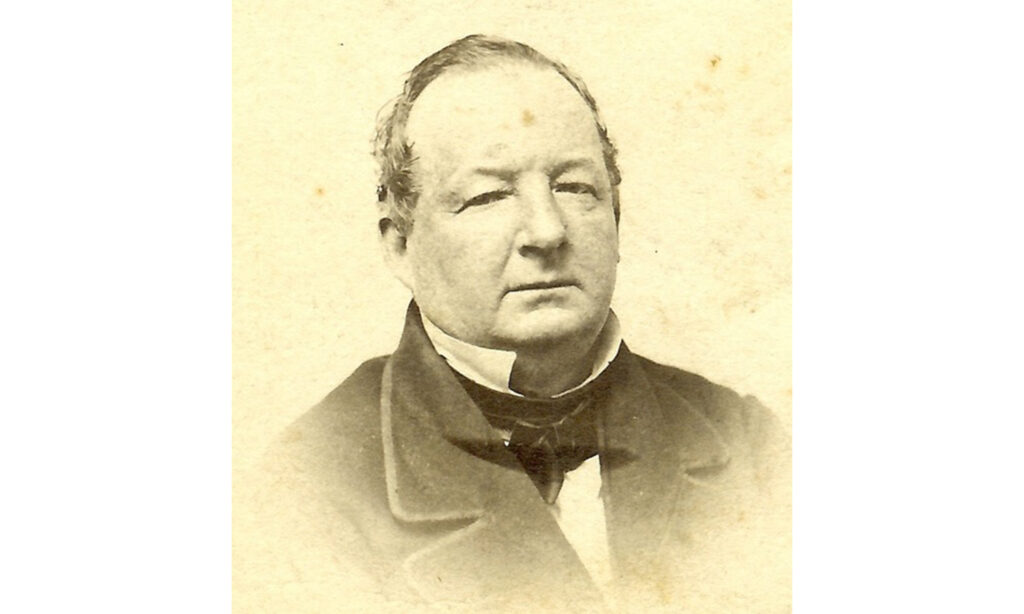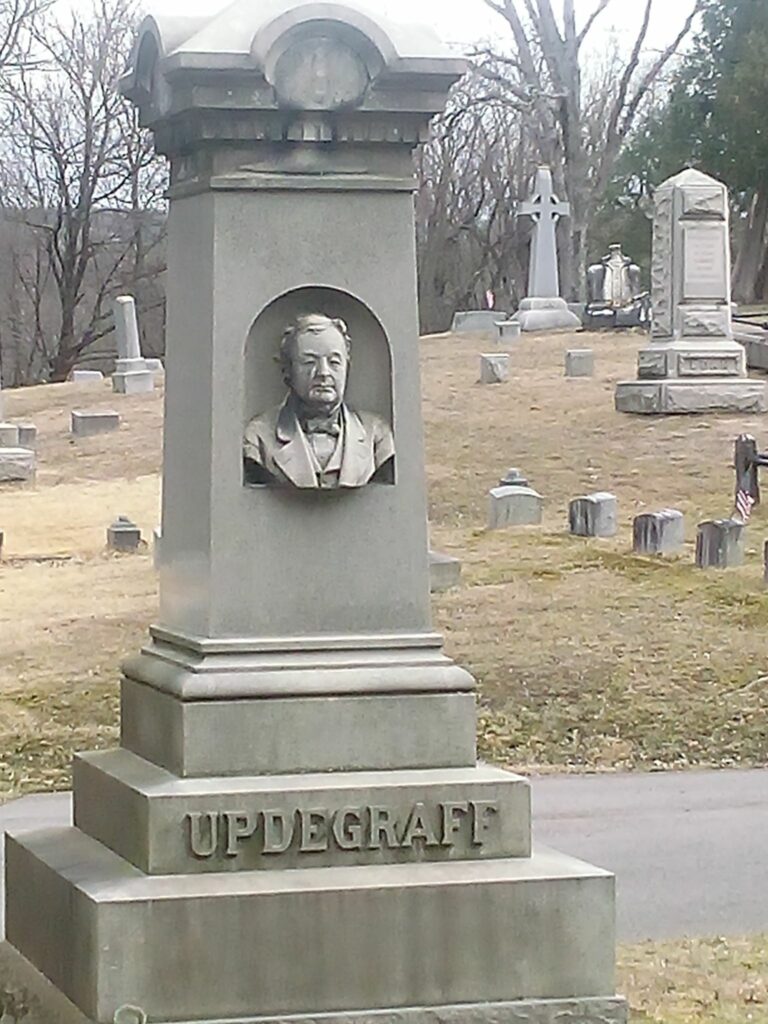
WILLIAMSPORT – Deep within Lycoming County’s history, Abraham Updegraff was a giant among men. During his time as a prominent leader in the city he condemned slavery and was instrumental in the founding of many permanent structures in the city today.
A memorial is built for Updegraff in the Wildwood Cemetery with his image carved into the pillar.

According to Mark Shifflet through a post on Facebook, Updegraff “owned one of the tanneries in town.”
He further explained that Updegraff “is most famous for being on the jury that tried the pro-slavery perpetrators of the Muncy Abolition Riot.”
“The jury was initially 11 to one in favor of acquittal,” Shifflet said. “Updegraff (was) the only one in favor of conviction, (and he) convinced the other jurors, in German and in English, to vote for conviction.” He compared it to the film “12 Angry Men.”
A proud heritage
It would appear that Updegraff came from a long line of individuals who had an interest in making Pennsylvania a better place.
“He was a descendent of Abraham Op Den Graeff who lived from 1646 until 1731. (His ancestor) was one of the first German settlers in Pennsylvania and signed the Germantown Petition against slavery, which was the first abolitionist protest of its kind in the American history,” Telffihs said.
The great poet John Greenleaf Whittier mentioned the name Op Den Graaf in the poem “The Pennsylvania Pilgrim.”
According to the Gazette & Bulletin (now the Williamsport Sun Gazette), in an April 17, 1884 article, he was the youngest in a family of seven kids.
“His father, Mr. Thomas Udegraff, and mother were raised and married in York. In September, 1799, they came to Williamsport in two canoes, having paddled their way up the river, with but twenty-five cents in money between them,” the article stated. Because Thomas Updegraff had experience as a tanner, he opened a business on Market Street.
Becoming a tanner
Abraham Updregraff was born in 1808. In 1819, he went to work in his father’s tannery. He continued working in the tannery for the next 16 years.
“In the spring of 1834 he entered into partnership in the mercantile business with Jacob Grafius,” said the article. On Feb. 12 of that year, he married Elizabeth Peterman. According to the “Abraham Updegraff” entry in the Wildwood Cemetery section of Find-A-Grave, the couple had seven children.
He served as both director and president of the Western Branch Bank from 1836 until 1856. In 1863, he helped establish the First National Bank of Williamsport.
“The capital of the bank was increased from time to time from the original amount of $100,000 to the present sum of $284,960 with a surplus of $90,000 showing great prosperity under his excellent management,” the article said. Updegraff’s bank became “one of the leading banking houses in the state.”
Updegraff would also help found the cemetery on Washington Street.
“He was also one of two, who, in 1850, laid out the Williamsport cemetery on Washington street, containing nearly nine acres,” the article stated. He then would go on to serve as president of the company that owned Wildwood Cemetery for two decades.
Updegraff was credited with helping establish bridges in the county and he worked for the lumber industry in different ways, however his passion seemed to be education.
“He was always a zealous advocate of the cause of education, and for some twenty years, officiated as the president of Dickinson Seminary (now Lycoming College),” the article said.
In 1840, both he and his wife were involved with Second Presbyterian Church “in which they took a devout interest.” He would go on to serve as the county’s Sunday School Association director. Within three years of him taking this position, “the attendance at the Sunday school became the largest.”
“True and loyal Abolitionist”
Updegraff became ill in March of 1884 and on April 16, he died after having “been confined to his bed by illness” for over a month.
“The news of his death, although not unexpected, was received with surprise by the community, and expressions of regret over the sad event were heard on all sides,” a writer for the Sun Gazette said, in the April 17, 1884 issue.
On April 18 of 1884, the First National Bank was described as having “been draped in mourning, outside and inside in memory” of Updegraff.
His funeral was held on that Saturday and a “large assembly of citizens of Williamsport, together with many from Muncy, Montoursville, Jersey Shore and Lock Haven, had gathered at the late residence … to show by their presence the respect they entertained for the deceased gentlemen while he was among the living.”
His casket, in his home, was surrounded by many bouquets of flowers.
“One of the most attractive of these was a large cross resting under an arch. It was the offering of the colored citizens of Williamsport, and bore upon it the following inscription: In bondage he was Our Friend, but (we) are free, and have not nor shall not forget Their Friend, though he sleeps,” a writer for the newspaper said.
The local A.M.E. Church held a special meeting to honor Updegraff. Rev. Enoch Gilchrist “paid a handsome tribute to the memory of the deceased. (Gilchrist) said he had been acquainted with Mr. Updegraff since 1844, and since that time he could truly say that (Updegraff) had proven himself tried and true to the colored race, not only in Williamsport, but he had represented the universal cause of freedom.”
George Roach, “the oldest colored man in the city,” said he had known Updegraff since 1816 and called him a “true and loyal Abolitionist.” Updegraff would work with Roach to “piloting slaves from bondage” to Canada. Updegraff provided his own carriage for such “toil and danger.”
The meeting concluded with a resolution honoring Updegraff. Charles Warfield said, “We have not language to express the sincere gratitude which we owe to Abraham Updegraff. We love to speak of men such as Napoleon, Alexander (the Great), Washington and Lincoln, and we shall, with as great pleasure, refer in the future to the name of Abraham Updegraff.”



Thanks for writing this! I knew some, but not all of this history- From, a living Updegraff relative, Sarah Updegraff
Thank you for writing this – I knew some but not all of this history. From a living Updegraff relative, Sarah Updegraff.
love reading about my family history. I had been told about this but didn’t have as much info.